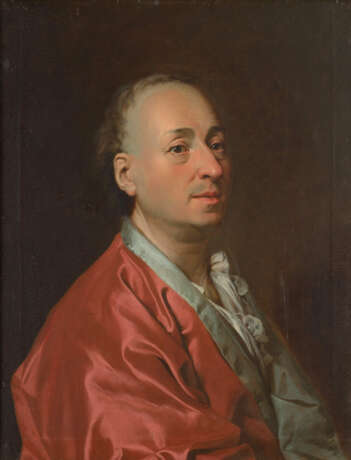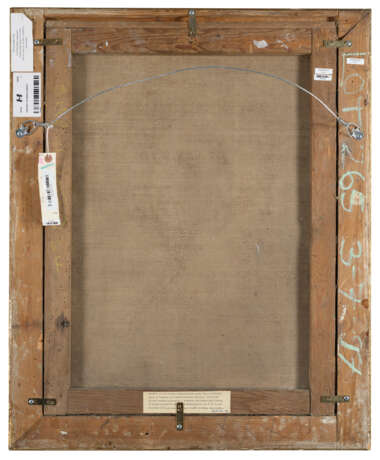ID 975005
Los 37 | DMITRI GRIGORIEVITCH LEVITSKI (KIEV 1735-1822 SAINT-PÉTERSBOURG)
Schätzwert
€ 150 000 – 250 000
Portrait de trois-quarts de Denis Diderot
huile sur toile, sur sa toile d'origine
69,4 x 52,4 cm. (27 1/3 x 20 2/3 in.)
Provenance
Vente anonyme, Sotheby's, Londres, 3 juillet 1997, lot 265.
Special notice
This lot is offered without reserve.
These lots have been imported from outside the EU for sale and placed under the Temporary Admission regime.
Import VAT is payable at 5,5% on the hammer price. VAT at 20% will be added to the buyer’s premium but will not be shown separately
on our invoice.
Post lot text
DMITRI GRIGORIEVITCH LEVITSKI, THREE-QUARTER-LENGTH PORTRAIT OF DENIS DIDEROT, OIL ON CANVAS, UNLINED
There is a certain self-reflexion in this depiction of the author of the Encyclopaedia: his gaze does not meet that of the viewer, and his mouth rests half-open as if to speak; the philosopher has chosen an elusive pose. The sitter stands in relief against a dark background that highlights the nuanced colour of his carelessly arranged clothing. With his open collar and exposing his natural baldness, Denis Diderot (1713-1784) is captured by Dmitri Levitski (1735-1822) in a careful and unadorned way that supports his image as a free-thinking bohemian.
It is likely that Dmitri Grigorievitch Levitski, a portraitist who deeply affected the development of the genre in Russia at the end of the 18th century thanks to his naturalist touch, painted this portrait during Diderot's stay in his native land between October 1773 to March 1774.
Ten years earlier, shortly after the coup d'état that put her on the throne, Catherine II (1729-1796) had invited Diderot to come to Russia. This was followed in 1765 by the proposal that the empress would buy his entire library and manuscripts from the philosopher on his death, grant him the title of librarian during his lifetime, and pay fifty years' rent in advance. Reluctant to make the trip to Russia, Diderot procrastinated before finally agreeing to go to St Petersburg to pay his debt of gratitude and meet the empress whom he admired for her cultural enlightenment despite his opposition to her absolutist policy.
This well-known portrait, together with the one by Louis-Michel van Loo (1707-1771) (Musée du Louvre, Paris, inv. no. RF 1958), is the image par excellence of the great Enlightenment philosopher, of whom few portraits are known, unlike for his contemporaries such as Voltaire (1694-1778) or Rousseau (1712-1778). Since 1829, the Musée d'art et d'histoire de Genève has held another version of this painting (inv. no. 1829-0009), formerly in the collection of the Genevan François Duval (1776-1854), whose father lived and worked in St Petersburg in the second half of the 18th century.
The son of an Orthodox priest who had worked as an engraver in the Monastery of the Caves, Kyiv, the young Levitsky trained as a painter in St Petersburg under Alexei Petrovich Antropov (1716-1795), Giuseppe Valeriani (1708-1761) and Louis-Jean-François Lagrenée (1724-1805), whose careful approach to painting drapery he maintained, as seen in the present portrait. Elected to the Académie in 1770, he taught there between 1771 and 1787.
| Künstler: | Dmitri Grigorjewitsch Lewizki (1735 - 1822) |
|---|---|
| Angewandte Technik: | Öl auf Leinwand |
| Genre: | Porträt |
| Herkunftsort: | Osteuropa, Europa, Russland |
| Kategorie des Auktionshauses: | Gemälde |
| Künstler: | Dmitri Grigorjewitsch Lewizki (1735 - 1822) |
|---|---|
| Angewandte Technik: | Öl auf Leinwand |
| Genre: | Porträt |
| Herkunftsort: | Osteuropa, Europa, Russland |
| Kategorie des Auktionshauses: | Gemälde |
| Adresse der Versteigerung |
CHRISTIE'S 9 Avenue Matignon 75008 Paris Frankreich | ||||||||||||||
|---|---|---|---|---|---|---|---|---|---|---|---|---|---|---|---|
| Vorschau |
| ||||||||||||||
| Telefon | +33 (0)1 40 76 85 85 | ||||||||||||||
| Fax | +33 (0)1 40 76 85 86 | ||||||||||||||
| Nutzungsbedingungen | Nutzungsbedingungen | ||||||||||||||
| Versand |
Postdienst Kurierdienst Selbstabholung | ||||||||||||||
| Zahlungsarten |
Banküberweisung | ||||||||||||||
| Geschäftszeiten | Geschäftszeiten
|





